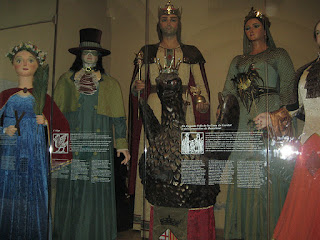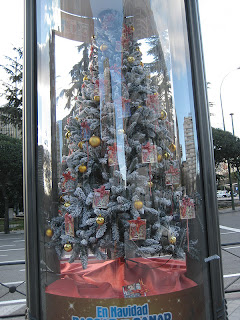With a little bit of regret I am interrupting my Barcelona series with a requested needle felting tutorial. Most of Spain is shut down for the holidays, so I have less classes and more time to do a tutorial of this size. Please let me know if you have any questions.
Here is my my stained glass flower series that hangs on my wall. I have had a lot of interest in tutorials for this type of art. I did the "paintings" in the order you see here. I started with the poppies and my husband suggested that I do series for the living room wall. So I chose flowers as the theme, and made sure they were all surrounded by a blue and white sky.
 |
| Poppies |
 |
| Purple roses |
 |
| Daffodils |
Instructions to make your own:
(Remember you can click any picture to make it bigger.)
Get a piece of felt (the flowers were done on a thrift store sweater I shrunk down). It is necessary to use a piece of felt larger that the size you want to make the finished object. I think that 1 inch or 2.5cm would suffice. The needlefelting process makes the fabric shrink more. The thicker the fabric, the less it shrinks. This fabric is a 1/2cm thick fabric I got from a felt store in the center of Madrid. (Which is a lucky find as I do not know where there are thrift stores here.)
Find a picture of a stained glass piece that you wish to imitate but not perfectly copy (unless you are a better artist than I). I usually find multiple pictures and take the elements I like out of each of them. However, it is not as important to find multiple pictures for a 2D image, and especially stained glass. Simple designs can just be winged, like this one for tutorial.
Get some black yarn it would be best if you got non-superwash 100% wool. Superwash and non- wool yarn is harder to felt into the piece (and can flatten out in strange ways as you can see). It can be done, but it is very fragile. I used fingering weight yarn, but you could use any size to vary your "glass seam" thickness. You could of course use silver yarn as well. All I had was 75% wool 25% nylon superwash fingering in black for this tutorial.
Get felting needles of all sizes, scissors, and a piece of felt to felt into.
Felting needles are different from sewing needles. They are either triangular or star shaped, and they have barbs running down the lower portion of the needle. The barbs are able to help tangle the fibers together, or felt, without the addition of water.
This website has a clear list of sizes of needles (I have never bought from them, but they look nice).
Basically the smaller the needle the higher the number (like with wire). The bigger the needle the less times you have to punch down the fiber but the bigger the needle hole you get in the fiber. The smaller the needle size the more times you have to punch down the fiber, and the smaller the needle hole. It is a good idea to start with a bigger needle then move on to a finer needle for the detail work. Star needles have more barbs and felt faster than triangle needles. For this piece I used a 36 Star needle and then a 38 triangle needle to finish.
I felt in my lines first, and then color in the space in between. Not only is it charmingly like coloring when you where little, it is easier this way. The only draw back is that you then have to be very careful to felt in the color up to the lines but not cover the black.
Scissors are your friend in felting, it is always a good idea to have then near by. Do not be afraid to cut the fibers if they are too long. A lot of long wools felt well, but if you try to fold them on top of each other it can be a mess. Use the scissors freely. The really good thing about flat felting is that it is easy to add more fiber, it is also fairly easy to rip the fibers completely from the "canvas"if they are not really attached. This will allow you to "place" fibers and see if they look right and them tear them away if they do not.
The best thing about my stained glass idea is the mixing of the colors. ALWAYS mix your colors, it gives them great depth, and it is a fun way to play with colors. If you do not like the result rip it out, and start again. This technique uses minimal wool so the waste is minimal, and often you can reuse your wool elsewhere.
In this piece I am mixing colors randomly (actually using up already mixed colors from another project). For general "stained glass" you can put in you lowlights and highlight wherever you want, you do not have to worry about creating shadow or light. like you would on more tradtional pieces.
Above you can see that I mixed in green as well as various oranges and yellows.
Finally I made sure that all of the edges next to the black lines where tidy and not showing "whitespace". Then I went over the whole pice with smaller needles (I think a 40 triangle), and finally I did something I have never done before and ironed it. Iron fills in the holes nicely. Here is how you iron: wet a wash cloth or small towel completely and then squeeze out the water until it is not dripping heavily. Then put the "piece" on an ironing board, put the washcloth on top of it (I fold mine at least once to have the iron farther away from the fabric, and let in more moisture) and press a hot iron on top for 3-5 seconds.
Then I trimmed the edges to tidy up everything.
Finally a picture of the back, where you can see that some wool came through the other side. This kind of art is very bulky, and it is difficult to frame, I am still looking for different ideas on how to frame. Glass can cause reflection that take away from depth you put in with shading, and plus frames that our deep enough are hard to find (both in the US and here in Spain).
Here is a link to my Flickr needlefelt folder if you wish to look at my projects and see different varieties of needlefelting.
Part two of my Barcelona trip will be up tomorrow.


















































